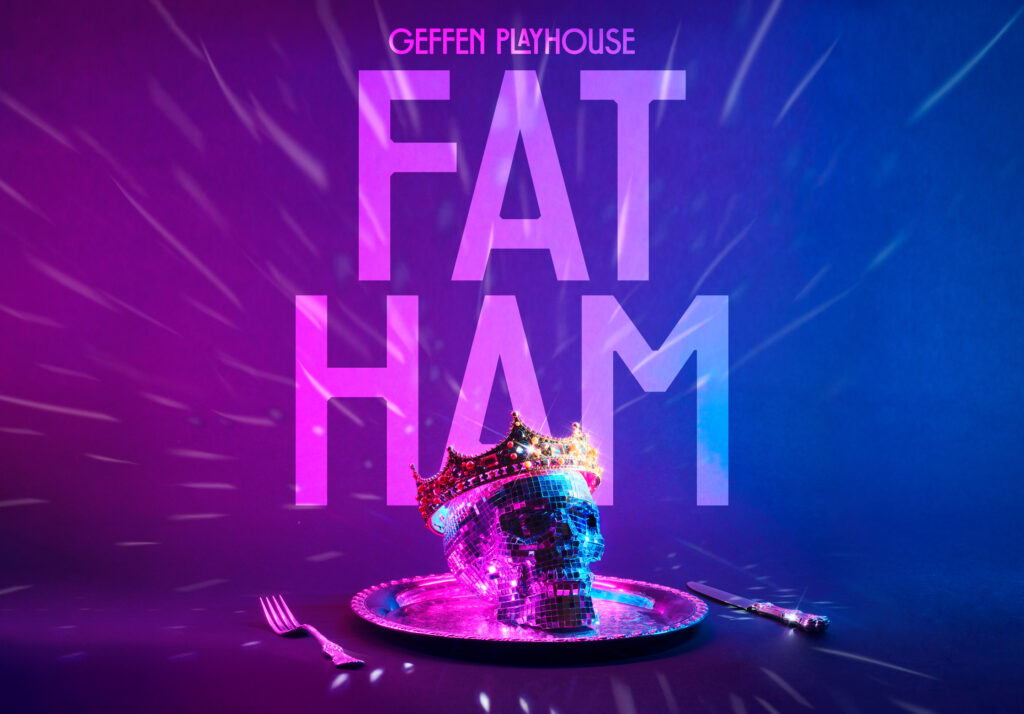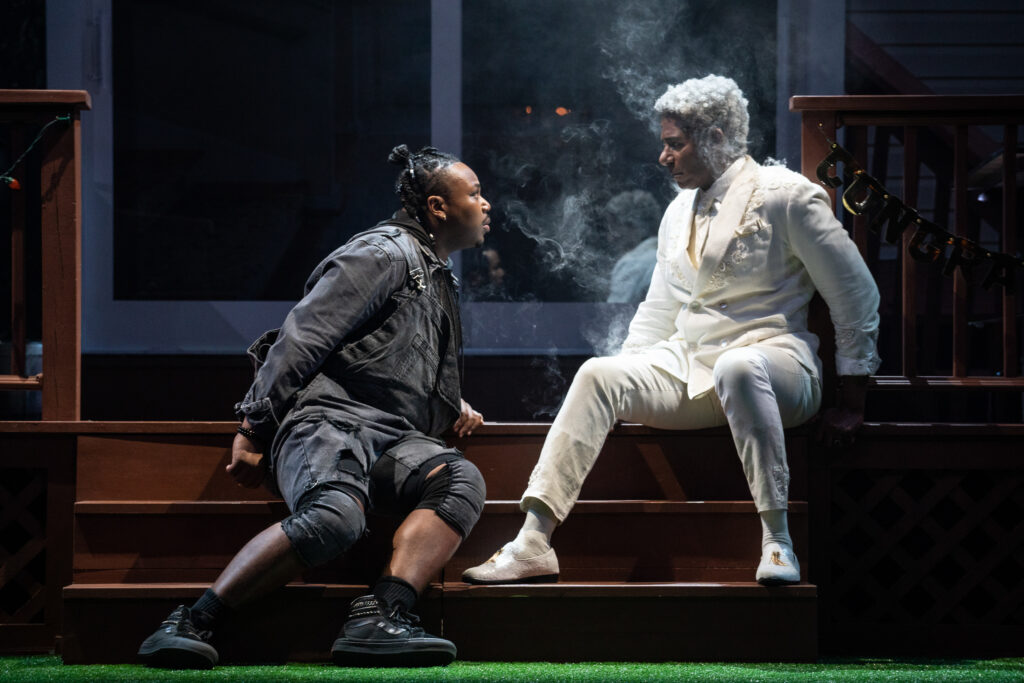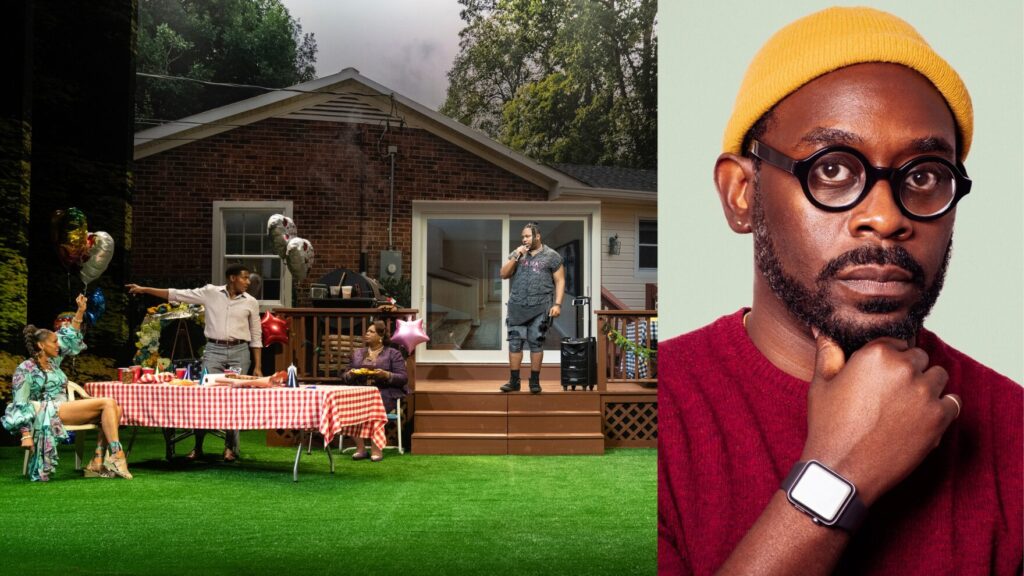Breaking ground: A conversation with James Ijames, Pulitzer Prize winner
We were first introduced to James Ijames through the groundbreaking production of his Pulitzer Prize-winning play, Fat Ham, which was co-produced by The Public and National Black Theatre. Discover the genius behind the laughter, as Ijames shares insights into his creative process, the cultural significance of his work, and the transformative power of theater in shaping our understanding of the world.
A trailblazer and recipient of numerous accolades, including the 2015 Pew Fellow for Playwriting and the 2022 Pulitzer Prize in Drama, James Ijames is known for his unique voice in the industry. As a founding member of Orbiter 3, Philadelphia’s first playwright producing collective, and an Associate Professor of Theatre at Villanova University, he continues to shape the landscape of contemporary theater. In this exclusive interview, we delve into the mind of James Ijames, exploring his journey, inspirations, and the acclaimed play that recently earned him a Tony nomination—Fat Ham, a comedic and contemporary riff on Hamlet that challenges societal norms and received the 2022 Pulitzer Prize in Drama.

His plays, celebrated across prestigious venues from Flashpoint Theater Company in Philadelphia to The Public Theater in NYC and Shotgun Players in Berkeley, have garnered recognition and development from renowned platforms such as PlayPenn New Play Conference, The Lark, and Playwright’s Horizon.
Ijames has been keeping busy over the past year. In this insightful interview with Queer Forty writer Jeffrey James Keyes, he reflects on the post-Fat Ham era, where the play’s regional success has taken on a life of its own, resonating with diverse communities beyond New York. As a trailblazer in the realm of queer storytelling, Ijames discusses the evolving landscape of LGBTQ+ narratives, addressing more profound, existential questions in contrast to the challenges of the past. From the unforgettable moment of winning the Pulitzer to the exhilarating journey on Broadway, Ijames shares highlights and takeaways that have shaped his unorthodox approach to writing and the soulful path he has carved in the world of theater. With newfound freedom, he delves into the world of film and TV, offering a glimpse into upcoming projects, including a musical collaboration with a pop star. Ijames opens up about his writing practice, emphasizing the importance of daily contribution to the craft.
Jeffrey James Keyes: James, I want to kick off with saying “what’s life like post-Fat Ham but I keep getting announcements about new productions of your play. What has the past few months been like for you?
James Ijames: Well, it’s the dream, right for the playwright, that the play sort of takes off and it has a regional life as well. You know, I come from the regional theater. I cut my teeth in Philadelphia. I really learned how to be an artist in Philadelphia. I’m glad that Fat Ham is meeting more communities. I’m glad that more than just folks in New York think it’s great. I’m excited to see it in the South at some point because I’ve seen it in DC so that’s close. But I’m excited to see it in a city like Atlanta or Charlotte. I always say that plays are gestures towards expanding community so this feels exactly like what that is like. The conversation is being had in more and more communities and that makes me really happy.
I feel like when you and I were younger there were only a few types of queer shows that were acceptable, and I wonder if Fat Ham is part of a new movement, or a catalyst for theaters opening the door for different, more diverse stories.
James Ijames: Queer people are once again sort of in the crosshairs of the culture wars of this country, which is sort of perennial activity that we have where we want to roll back things that we agree with or think are good. I think it’s important for us to continue to tell those stories. I think one thing is different: I think people are writing, or I’ll speak for myself, I try to write about the world that I want to see. I’m not trying to write utopia, but I am trying to write a world where everybody is at least trying to do something, trying to be good in the world, trying to affect some good in the world. I also think that our ability to tell different kinds of queer stories is like directly connected to if we look back to the eighties and nineties playwrights were grappling with the question, do we exist? Can we survive? Are we actually the thing that people think we are like? I think those were the questions that dramatists and theatremakers in that era were sort of grappling with.
I think we’re grappling with different questions. I think for the first time, you know, they’re queer plays that are really grappling with what it means to age as a queer person, for example. There hasn’t been a ton of that and I think you know, you know, the number of artists that we lost, you know, to HIV and AIDS, I think had a really direct impact on the kind of stories that get told and I think our relationship to that has changed drastically. So that is no longer this sort of grip or the primary great crisis of our community. We can get married now. So that’s not the crisis anymore. I think we’re writing slightly more existential stuff. We’re asking questions about bigger things as it pertains to our queer existence, like, what does honor mean for us? What does revenge mean for us? Now, I think we get to ask these larger human questions, whereas before we were grappling with problems that exist in our community. We need you to understand them so that you can understand us and I think now our questions are more like what do I think about what this means? Who am I in the world like it’s just I think we have a slightly different set of questions that we’re grappling with. I think that’s had a really big impact on how writers are writing. I also think that when I first started writing, I didn’t write about my queer identity at all. Mostly because I’m sort of that bridge generation between the kids that come out at thirteen and the kids that come out when they’re twenty-six. I came out when I was in grad school, because I was finally away from home and I felt like I could be free. I think that also has had a big impact on the change in how these plays are being written and what they’re getting written about. The ability to be open and fully yourself in the world is just becoming more accessible to us.


Photos of Fat Ham by Joan Marcus
Thinking back on the past few years, what are a few highlights, or meaningful moments you’ll never forget?
James Ijames: As long as I live I’ll never forget the day that I found out that I won the Pulitzer. You find out when the world finds out, like, you don’t get a heads up…and then your phone just doesn’t stop ringing for a few days. That was a surreal experience, a really beautiful experience. And those are the moments. I’m not on Facebook anymore, and one of the things that I really loved about that moment was that so many people were sending me pictures of things that people have posted on Facebook. And most of the things people were posting were like people who had encountered me once, like there was a person that encountered me at an Escape Room and said I “was nice.” And I was like, Oh good. The person I’m trying to be in the world is like the person that people are meeting. So it was a beautiful mirror of both how I’m how I’m seen and how I’m perceived. And how that connects to how I see or perceive myself.
Broadway was an incredible highlight from last year. With all the things that come with it, the Tony nomination, the Tony experience, the award show, the lead up to that all of that was really great. But they were these takeaways that I have. My approach to writing has always been a little unorthodox and my path and my writing career has not been typical. And the journey of this play is sort of the epitome of that. And so it sort of taught me something about finding my own path. It taught me something about you figuring out what your rhythm is. I think sometimes when we’re starting out, we look at people who are ahead of us and we sort of emulate or we try to copy what they do. And I did that as well. And that was a moment where I said I think I’m just gonna really trust what my gut is telling me or I’m going to let instinct lead here. I’m going to go with value versus necessarily the smartest career move to go. I’m gonna go with the thing that fits with my values the best that I can. I made a point to build my career as a theatre artist in a city like Philadelphia where I can have a great deal of freedom. I think that intentionality has made a difference in my career.
The major takeaway is to lean into the thing that feels uncomfortable, or strange or not typical, because that’s probably where you’re gonna find the success that you’re looking for. I want my career to feel soulful, like it’s steeped in value, and like it’s moving in a way that feels really organic and not crafted or calculated. It’s a series of strange choices. I gained this weird skill set, and that has affected me as a writer. I worked at the National Constitution Center for a long time doing freedom rising. I did some writing there, one of the mandates for the theatre at the museum there is that it has to be by a it has to be nonpartisan: it cannot be politically leaning in either direction. It has to just be talking about the big idea. That’s had a big impact on me as a writer: if you write the characters grappling with the big ideas people are gonna show up.
I’m really interested in this moment for you. You must have more freedom to work on what you want to work on.
James Ijames: I have much more of an ability to speak with greater authority about what I want to be doing versus what I don’t want to be doing. And I say no more than I ever have. And that is a kind of freedom. I’m working on a ton. I am continuing to explore and build the relationships that I want in the film and TV space, which I’m really hungry for because I think it gives you an ability to talk to a larger audience and grapple with ideas with a bigger canvas. I’m excited to see what that stuff offers me without leaving the theater because it’s my first love.
I spent the last several months getting caught up on some commission’s that I’ve been working on. That work is coming along nicely and is starting to move into development in different places where we’re in the process of finding a partner to develop Fat Ham for film. So that’ll be a thing that hopefully will be happening sooner versus later. I’m in big research mode for other projects. I’m teaching, but I’m mostly writing. I’m not back in rehearsal again until the fall at The Public Theater this fall. I went right back to work. I didn’t rest in it very long. I was like, it’s time to start writing again. And it’s good that it’s still there. After all of this, I was like, “what if I can’t write enough, or what happens if I can’t do this again?” And I’ve written since then. So I’m like, Okay, I think I’m alright, I can do this.”
I understand there’s a musical in the works. Can you share anything about it yet?
James Ijames: I’ve been working on a musical with a pop star, it’s hopefully going to be happening next summer, leading into the fall of the following year.
You seem really excited about it.
James Ijames: Yeah, it’s it’s, it’s special. I think it’s gonna be a special production.
Tell me about your writing practice? What’s your advice for others?
James Ijames: You really do have to do it every day. And I do mean do it every day. That doesn’t necessarily mean you sit down at your computer and you’re I am writing for X amount of hours or X amount of minutes. You could be outlining on your notes app. You could be watching something, but you gotta be contributing to the flow of your work every day. It could be more research than you’re reading, talking to your agent about something, talking to a colleague about something, watching a movie that’s in a style that’s going to help you. Whatever it is that you’re doing that day, every day you should be doing something to advance the practice, and specifically something to advance something you’re working on. This is the thing I had to build in my thinking because I used to think, “oh, if I don’t sit down at my computer and write for four hours, I’m not a writer.” But I gotta work. I gotta have a job. I worked at museums, I did all sorts of stuff. I still teach at Villanova. Having a job is something I still feel like I very much need. When you have that, you have built the practice into your life. It doesn’t take over. I still have fun, I still have downtime. I still watch things that have nothing to do with what I’m working on. But I think what I’ve done is just conditioned myself to always be a writer, even when I’m not writing and what that means is that anything that I’m absorbing, anything that comes into my presence, that is also writing. I’m composing in my head. I was in Montreal over the holidays. And it was just something kind of magical because I have just enough French to be able to maneuver a little bit. And my “writer brain” was glitching because I was like, I can’t, I’m not able to draw in everything. This is frustrating to me because I’m always taking in everything around me, that is a part of the practice. I write on the toilet. I’ve stopped working out to write something on my phone. I write in Final Draft, so I have Final Draft on a desktop, on a laptop, and on my phone at any moment. Anywhere I am. I can work on a play that I’m writing. And that’s how I’m able to do it. I’m just kind of constantly doing it a little bit. And that’s been working. I’ve been trying to formalize more. It doesn’t feel natural but I do need to do it because there’s a bunch of stuff I need to get done. I have tried to formalize it more because I have more than I have to do but it feels the most soulful when it’s just sort of emerging in my life.
Can you tell me how your childhood in North Carolina has influenced your work?
James Ijames: I loved growing up in North Carolina. I love growing up in the family that I grew up in. I grew up in a really big family with like, close, extremely close extended family. I’m extremely close to my aunts and uncles. I’m extremely close to my grandmother’s siblings and their kids and their kids. I had a massive collection of people around me growing up. We’re a family of people who like to recount stories, and my family recounts stories in very theatrical ways like they do the voices of people when they’re recounting a conversation. “And then She said,” They perform it and so that’s just always been the way that I spoke and and I’ve always felt that that’s where the sort of theatrical impulse came from me. I grew up in a Baptist church, St. James Missionary Baptist Church, and which I always thought was so bizarre because my name is James and that the first place I acted was at that church, the first play that I ever wrote was done at that church. That time and place has had a big impact on how I approach dialogue, in terms of sound as opposed to necessarily the word. You want the words to make sense. Of course, you have to use things that make sense in the text. I think it’s a special skill that I learned from my family to choose a word that sounds more musical. There’s this moment in Fat Ham, where [the character] Rev says “you bring it down to optimism”, which is a really ornate way to say you’re a real downer. I could have just written “man, you just bring down the mood.” It’s so flat to do it that way. And so I grew up with people who wouldn’t use language musically. And that has had probably the biggest impact on me as a playwright. I want to find the right word, the words that sound the best in the air, and that an actor will find the most pleasurable to speak. And I draw that line directly back to like, listen to my grandmother. Gossip about church, or gossip about work. Or my aunts and uncles and my mom, you know, tell it a story about something that happened from their childhood and they’re playing all of those parts. Yeah, then I just understand the world that way. To tell a story you have to embody it.
What are your hopes for the rest of the year?
James Ijames: I want to have something on TV. I want that to happen this year. I want to have another show in New York. I want to write another play this year, maybe two if I can, if I can make it happen. What else do I want? I want to be able to go on a long vacation after all of that. I want to be able to go somewhere really pretty. Yeah. Happiness, health, all that good stuff. But career wise, I want to move into this new space of film and TV. I think I have some things to offer there.
Fat Ham will make its Los Angeles debut at The Geffen Playhouse this spring. For more information, visit their website here.






